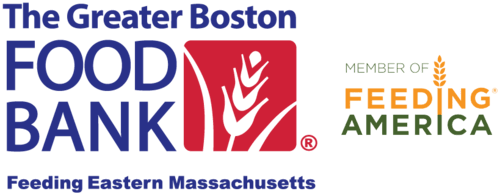The many faces of food insecurity
Nantucket, Home of soft sands, high end homes. And food insecurity?
Part Three: The many faces of food insecurity.
During the COVID-19 lockdown, the Nantucket Food Pantry home-delivered food to approximately 850 households across the island, many families with children. This summer, the pantry is serving around 250 households at their location downtown. This includes families born and raised on the island and those seeking the in-demand seasonal jobs that support the island’s tourist industry – and their families back home.
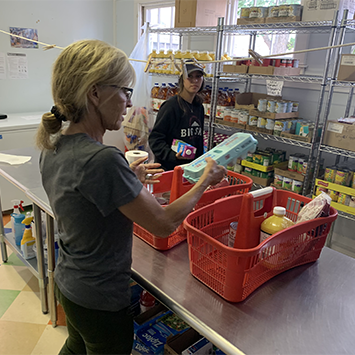
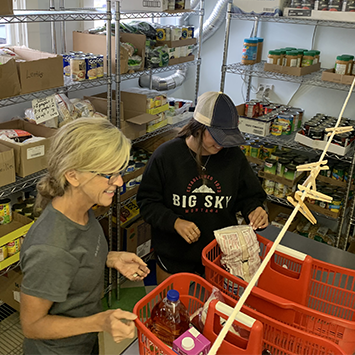
(Pictured above: Volunteers of the Nantucket Food Pantry ensure equitable distribution to all visitors. In addition, they pack boxes to be delivered to those unable to come downtown.)
Matthew, one longtime local, typically works two jobs but is recovering from an injury. He just started coming to the pantry and doesn’t want his friends and co-workers to know he’s here. “I’m sort of embarrassed to need this help,” he confides.
Another woman, Lisa, drives up in her car. She was born on the island and now lives in senior housing. She doesn’t want anyone to know she is there… but her SNAP benefits, formerly known as food stamps, only go so far. She gets what she can at the supermarket and must rely on the food pantry for the rest.
Other pantry clients, including those from other countries who have come to work in Nantucket this summer, like the Caribbean, Colombia, Jamaica, Morocco, and Eastern Europe, are even more shy about accepting the food. They need it, but they don’t feel entirely comfortable taking it.
Is it from a church, they wonder? Or the government? Will they get in trouble if they accept the food? Utilizing food pantries and receiving SNAP benefits will not affect someone’s status, but the chilling effects of the Trump administration’s public charge efforts have left a deep fear within immigrant communities.
Often, they are working two or three jobs, living in rented dorm rooms, and still, food insecurity is a problem.
The pantry doesn’t open for another hour, but people want to ensure they don’t miss the window and get there early. When you join the line, a volunteer gives you a clipboard with the list of available food. The client checks the box for the number of people living in their household. Then, volunteer packers inside assemble the order. Due to Covid-19 safety restrictions, only staff and volunteers can enter the pantry offices at this time.
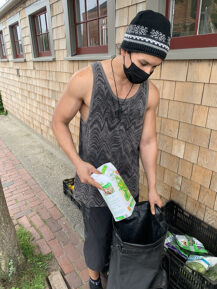
Youssef is from Morocco. He’s wearing a mask and a hat, and he’s very worried about Covid-19. That’s why he left Morocco in April, washing dishes and cleaning rooms at an inn on the island. The inn gave him a basement room with no kitchen, windows, or electricity. He can only take food that requires no cooking. “But still, it’s a room,” he says cheerfully.
Stephanie is also registering for the first time today. She is a full-time Island resident and works at the local post office but had surgery this winter. Her disability coverage recently ran out, and she became homeless, along with her children, and is now camping out with a friend. She needs to feed her family and contribute to the household as she heals. “It’s a temporary situation,” she says as the line slowly moves forward and closer to her turn.
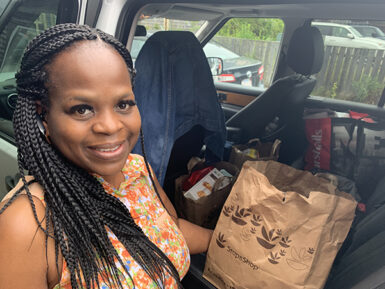
Setting up for the afternoon, pantry volunteers get ready to distribute food. Most of the lot has traveled from The Greater Boston Food Bank warehouse and across the ocean by ferry, but some items are provided locally.
Crates of fresh produce rescued from local farms are set out on the sidewalk, and inside the pantry, hard-working volunteers are packing boxes for clients in line. There are racks of canned goods and shelf-stable staples like boxes of pasta and sacks of flour and cornmeal. There are eggs and frozen chicken thighs, bags of carrots and potatoes, and heads of cabbage.
A van rolls up from a local Nantucket Bakery, Something Natural. It unloads a trunk full of Portuguese sourdough packed into bags. Local restaurants drop off unsold pastries and sandwiches. It sounds like a plentiful harvest, but it is not.
For the pantry’s clients, this food is a lifesaver.
